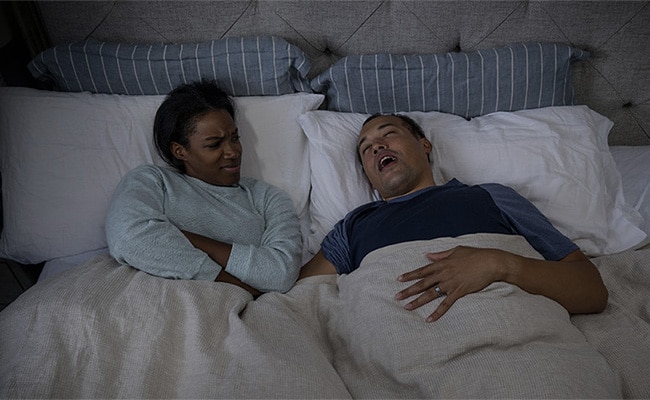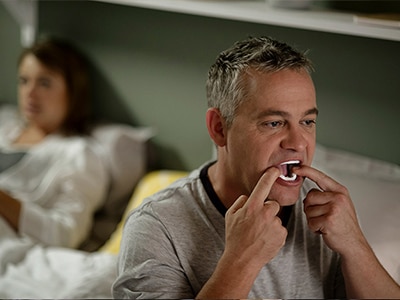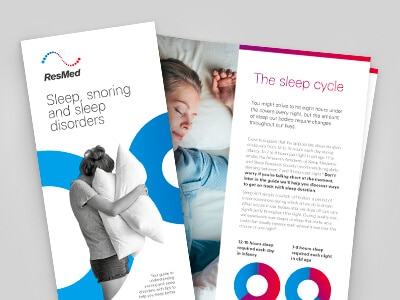What causes snoring?

Is it really possible to ‘cure’ snoring? And if you snore, why is it important to know the reason for this common condition?
How to get help with snoring
If you snore – especially if you snore loudly – you know how disruptive it can be. You might be embarrassed to fall asleep when you travel or stay with friends. Maybe your partner complains about your habitual snoring and banishes you to the spare room or sofa. In fact, 95% of snorers say their snoring bothers their partner1.
Fortunately, you’ve come to the right place for help with snoring: at ResMed, we’re experts in treating sleep-related breathing issues, including problem snoring.
Why do people snore?
Some people snore because of the shape of their nose or jaw. If you have an enlarged tongue or tonsils or carry excess weight around the neck, you may also be prone to snoring. Several other factors that can cause you to snore, or snore more loudly, include fatigue, a higher body mass index, pregnancy, sleeping on your back, and drinking alcohol before bed. If you have a cold or nasal congestion, you may also snore temporarily.
When we’re asleep, the muscles in our necks relax. Sometimes, they relax so much that the upper airway partially closes, narrowing the passageway through which air travels to our lungs. This narrowing makes the air vibrate in your throat and soft palate when you breathe, and this vibration causes the familiar sound of snoring2,3.

Does everyone snore?
Almost 40% of men snore loudly and often, but they’re not alone.
20% of women snore, too4.
Facts about snoring
Snoring is common
It’s estimated 40% of the investigated population report snoring (proportion is age-dependent)5
Family and bed partners lose sleep
95% of snorers say their snoring bothers their family or bed partner1
Snoring and other health problems
Snorers are 1.6 times more likely to develop arterial hypertension (high blood pressure) within four years of starting to snore6
People who snore may also have sleep apnoea
1 in 3 men and 1 in 5 women who snore could suffer from sleep apnoea7
Snoring is common
It’s estimated 40% of the investigated population report snoring (proportion is age-dependent)5
Family and bed partners lose sleep
95% of snorers say their snoring bothers their family or bed partner1
Snoring and other health problems
Snorers are 1.6 times more likely to develop arterial hypertension (high blood pressure) within four years of starting to snore6
People who snore may also have sleep apnoea
1 in 3 men and 1 in 5 women who snore could suffer from sleep apnoea7
Snoring can also be a sign of a serious medical disorder: obstructive sleep apnoea (OSA)
OSA is a sleep breathing disorder that’s characterised by breathing pauses called apnoeas. These last for 10 to 30 seconds or more and can be repeated more than 30 times per hour, stopping air from flowing to the lungs temporarily. These apnoeas lead to micro-awakenings that disrupt your sleep and affect your quality of life and your health.
In France, a study showed an overall OSA likelihood of 21% in the adult population: 24% in men and 18% in women9, with the knowledge that more than 80% of patients remain undiagnosed10. That’s why it’s important to report severe snoring over a sustained period to your doctor.
Keep exploring

Treatment for snoring
Dozens of products claim to treat snoring. Our Narval mandibular advancement device is a clinically proven solution that prevents loud snoring in 89% of patients who use it. Narval is thin, light, discreet and custom-made to fit in your mouth and does not disturb you while you sleep.

Sleep, snoring and sleep disorders
Are you getting enough good quality sleep? This guide explores common sleep problems and how to fix them.

What is sleep apnoea?
Many people have sleep apnoea, but may not even know it. In fact, sleep apnoea affects more than 3 in 10 men and nearly 1 in 5 women, so it’s more common than you might think.
References:
- Survey by A+A Healthcare of a sample of 1000 subjects representative of the general population over the age of 25 years with mild OSA and AHI <15 – January 2011 – Available on www.ronflement-equinox.fr
- Sarkis LM & al. Australasian Sleep Association position statement on consensus and evidence based treatment for primary snoring. Respirology. 2023 Feb;28(2):110-119. doi: 10.1111/resp.14443.
- Rowley JA. Snoring in adults. https://www.uptodate.com/contents/search. Accessed Oct. 18, 2023.
- Alakuijala A, Salmi T. Predicting Obstructive Sleep Apnea with Periodic Snoring Sound Recorded at Home. J Clin Sleep Med. 2016;12(7):953-958. Published 2016 Jul 15. doi:10.5664/jcsm.5922
- Ohayon, M.M., et al., Snoring and breathing pauses during sleep: telephone interview survey of a United Kingdom population sample. BMJ, 1997. 314(7084): p. 860-3.
- Hu, F.B., et al., Prospective study of snoring and risk of hypertension in women. Am J Epidemiol, 1999. 150(8): p. 806-16.
- Lechner, M., et al., Snoring and breathing pauses during sleep: interview survey of a United Kingdom population sample reveals a significant increase in the rates of sleep apnoea and obesity over the last 20 years – data from the UK sleep survey. Sleep Med, 2019. 54: p. 250-256. You can say that 1 in 5 snorers (men or women) could suffer from sleep apnea.
- Vecchierini MF & al. A custom-made mandibular repositioning device for obstructive sleep apnoea-hypopnoea syndrome: the ORCADES study. Sleep Med. 2016 Mar;19:131-40. doi: 10.1016.
- Balagny P et al. Prevalence, treatment and determinants of obstructive sleep apnoea and its symptoms in a population-based French cohort. ERJ Open Res. 2023;9(3):00053-2023. Published 2023 May 15. doi:10.1183/23120541.00053-2023
- Young T, Evans L, Finn L, Patta M. Estimation of the clinically diagnosed proportion of sleep apnoea syndrome in middle-aged men and women. Sleep 1997; 20: 705-706.
Content last updated: 02/2024